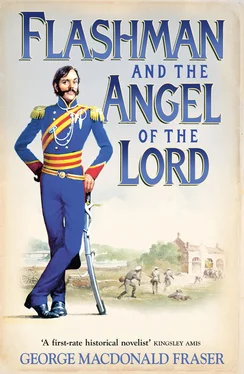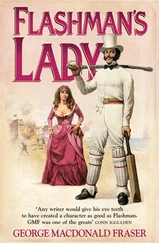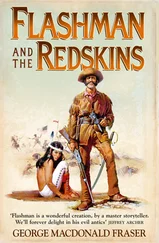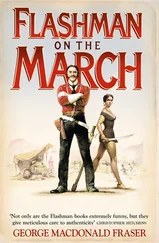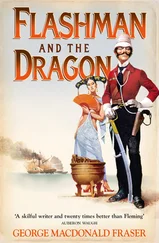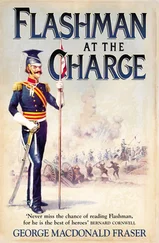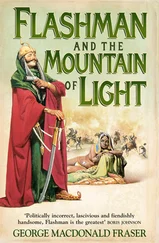When Hughes axed Flashman from Tom Brown’s Schooldays , brutally and suddenly (on page 170, if I remember rightly), it seemed a pretty callous act to abandon him with all his sins upon him, just at the stage of adolescence when a young fellow needs all the help and understanding he can get. So I adopted him, not from any charitable motives, but because I realised that there was good stuff in the lad, and that with proper care and guidance something could be made out of him.
And I have to say that with all his faults (what am I saying, because of his faults) young Flashy has justified the faith I showed in him. Over the years he and I have gone through several campaigns and assorted adventures, and I can say unhesitatingly that coward, scoundrel, toady, lecher and dissembler though he may be, he is a good man to go into the jungle with.
George MacDonald Fraser
Dedication Contents Cover Title Page Copyright How Did I Get the Idea of Flashman ? Dedication Explanatory Note Map Chapter 1 Chapter 2 Chapter 3 Chapter 4 Chapter 5 Chapter 6 Chapter 7 Chapter 8 Chapter 9 Chapter 10 Chapter 11 Chapter 12 Chapter 13 Chapter 14 Chapter 15 Chapter 16 Chapter 17 Chapter 18 Chapter 19 Chapter 20 Chapter 21 Appendix I Appendix II Appendix III Footnotes Notes About the Author The FLASHMAN Papers: In chronological order The FLASHMAN Papers: In order of publication Also by George MacDonald Fraser About the Publisher
For Kath, ten times over
Contents
Cover
Title Page
Copyright
How Did I Get the Idea of Flashman ?
Dedication
Explanatory Note
Map
Chapter 1
Chapter 2
Chapter 3
Chapter 4
Chapter 5
Chapter 6
Chapter 7
Chapter 8
Chapter 9
Chapter 10
Chapter 11
Chapter 12
Chapter 13
Chapter 14
Chapter 15
Chapter 16
Chapter 17
Chapter 18
Chapter 19
Chapter 20
Chapter 21
Appendix I
Appendix II
Appendix III
Footnotes
Notes
About the Author
The FLASHMAN Papers: In chronological order
The FLASHMAN Papers: In order of publication
Also by George MacDonald Fraser
About the Publisher
Of all the roles played by Sir Harry Flashman, V.C., in the course of his distinguished and deplorable career, that of crusader must seem the least likely. The nine volumes of his Papers which have been presented to the public since their discovery in a Midlands saleroom in 1966 make a scandalous catalogue in which there is little trace of decent feeling, let alone altruism. From the day of his expulsion from Rugby School in the late 1830s (memorably described in Tom Brown’s Schooldays ), Flashman the man fulfilled the disgraceful promise of Flashman the boy; the toadying bounder and bully matured into the cowardly profligate and scoundrel who, by chance and shameless opportunism, became one of the most renowned heroes of the Victorian age, unwilling leader of the Light Brigade, fleeing survivor of Afghanistan and Little Big Horn, tarnished paladin of Crimea and the Mutiny, and cringing chronicler of many another conflict, disaster, and intrigue in which he bore an inglorious but seldom unprofitable part.
So it is with initial disbelief that one finds him, in this tenth volume of his memoirs, not only involved but taking a lead in an enterprise which, if hopeless and misguided, still shines with the lustre of heroic self-sacrifice and occupies an honoured niche in the pantheon of freedom. John Brown’s raid on Harper’s Ferry was a dreadful folly which ended in bloody and inevitable failure and helped to bring on the most catastrophic of all civil wars, yet its aim was a great and worthy one; the road to hell was never paved with nobler intentions. Needless to say, they were not Flashman’s. He came to Harper’s Ferry with the utmost reluctance, through the malice of old enemies and the delusions of old friends, and behaved with characteristic perfidy in every way but one: his eye for events and people was as clear and scrupulous as ever, and it may be that his narrative casts a new and unexpected light on a critical moment in American history, and on notable figures of the ante-bellum years – among them the President Who Never Was, a legendary detective and secret agent, and the strange, terrible, simple visionary, known to the world only by a name and a song, who set out to destroy slavery with twenty men and forty rounds apiece.
It is an amazing story, even for Flashman, but my confidence in that honesty which he brought to his writing (if to nothing else) seems to be justified by the exactness with which his account fits the known facts. As with previous packets of the Papers, I have observed the wishes of their custodian, Mr Paget Morrison, and confined myself to amending the author’s spelling and providing footnotes and appendices.
G.M.F.
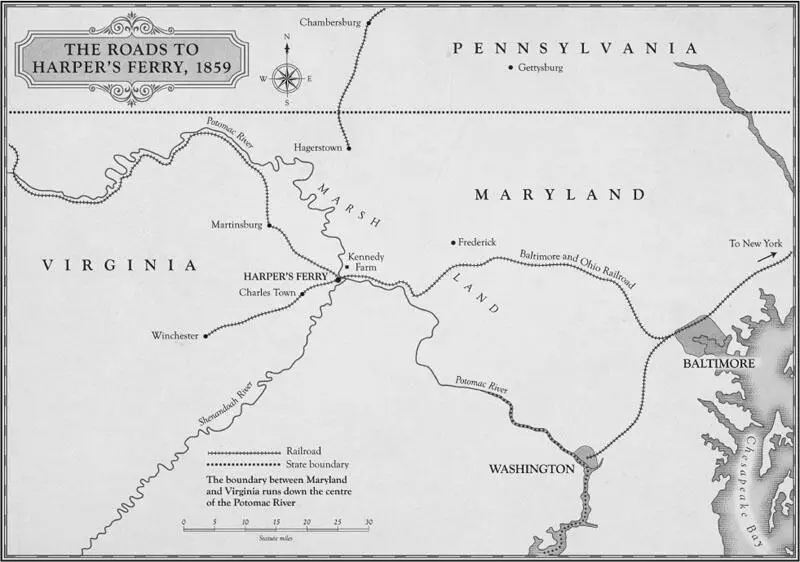
As I sat by the lake at Gandamack t’other day, sipping my late afternoon brandy in the sun, damning the great-grandchildren for pestering the ducks, and reflecting on the wigging I’d get from Elspeth when I took them in to tea covered in dirt and toffee, there was a brass band playing on a gramophone up at the house, a distant drowsy thumping that drifted down the lawn and under the trees. I guess I must have hummed along or waved my flask to the old familiar march, for presently the villain Augustus (a frightful handle to fix on a decent enough urchin, but no work of mine) detached himself from the waterweed and came to stand snottering before me with his head on one side, thoughtful-like.
‘I say, Great-gran’papa,’ says he, ‘that’s Gory Halooyah.’
‘So it is, young gallows,’ says I, ‘and Gory Halooyah is what you’ll catch when Great-grandmama sees the state of you. Where the devil’s your other shoe?’
‘Sunk,’ says he, and gave tongue: ‘“Jombrown’s body lies a-moulderin’ inna grave, Jombrown’s body lies –”’
‘Oh! Gweat-gwampapa said a wicked word!’ squeals virtuous Jemima, a true Flashman, as beautiful as she is obnoxious. ‘I heard him! He said “d—l”!’ She pronounced it ‘d’l’. ‘Gweat-gwanmama says people who say such fings go to the bad fire!’ Bad fire, indeed – my genteel Elspeth has never forgotten the more nauseating euphemisms of her native Paisley.
‘He shan’t, so there!’ cries my loyal little Alice, another twig off the old tree, being both flirt and toady. She jumped on the bench and clung to my arm. ‘’Cos I shan’t let him go to bad fires, shall I, Great-grampapa?’ Yearning at me with those great forget-me-not eyes, four years old and innocent as Cleopatra.
‘’Fraid you won’t have a vote on the matter, m’dear.’
‘“Devil” ain’t a bad word, anyway,’ says John, rising seven and leader of the pack. ‘The Dean said it in his sermon last Sunday – devil! He said it twice – devil!’ he repeated, with satisfaction. ‘So bad scran to you, Jemima!’ Hear, hear. Stout lad, John.
‘That was in church!’ retorts Jemima, who has the makings of a fine sea-lawyer, bar her habit of sticking out her tongue. ‘It’s all wight in church, but if you say it outside it’s vewwy dweadful, an’ God will punish you!’ Little Baptist.
‘What’s moulderin’ mean, Great-gran’papa?’ asks Augustus.
‘All rotten an’ stinkin’,’ says John. ‘It’s what happens when you get buried. You go all squelchy, an’ the worms eat you –’
‘Eeesh!’ Words cannot describe the ecstasy of Alice’s exclamation. ‘Was Jombrown like that, Great-grampapa, all rottish –’
Читать дальше
